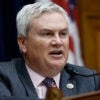
Within the much-debated continuing resolution—an appropriations bill to fund the federal government through September 2011—is a bit of hope for students in the nation’s capital. The spending bill would remove language inserted in 2009 by Senator Richard Durbin (D–IL) prohibiting new students from receiving scholarships through the D.C. Opportunity Scholarship Program (DCOSP). Despite its success, the program has been hanging by a lifeline for the last two years.
Since 2003, the scholarships have helped thousands of low-income students escape the failing D.C. public schools by giving them the opportunity to attend private schools of their choice. Yet, despite this program’s great track record—displayed by higher graduation rates and reading scores of students, as well as by overwhelming parental satisfaction and community support—the Obama Administration stood by as the program was placed on life support. As a result, D.C. families have been left uncertain about their children’s educational futures.
Now, the House is attempting to reverse the course of the previous legislation via the continuing resolution. Included in the bill is language that would restore funding for the program and make funds “available to new students, without regard to whether any student received a scholarship in any prior school year,” effectively lifting the prohibition on new students entering the program.
And with all the talk of getting debt under control and using taxpayer dollars efficiently, the DCOSP should not be overlooked. While D.C. public schools spend approximately $18,000 per-pupil annually, D.C. Opportunity Scholarships amount to less than half the price at $7,500 per scholarship. While 91 percent of DCOSP students graduate, only 70 percent of their peers with similar characteristics complete high school. Patrick J. Wolf of the University of Arkansas reports:
Speaker of the House John Boehner (R–OH) has also introduced a bill to restore and expand the program.
Policies that increase educational opportunity and improve education for the nation’s children—and, no less, do so in a fiscally responsible way—are a win–win for everybody. Shutting the door on the DCOSP would only mean closing doors to a bright future for so many of the nation’s children.




























